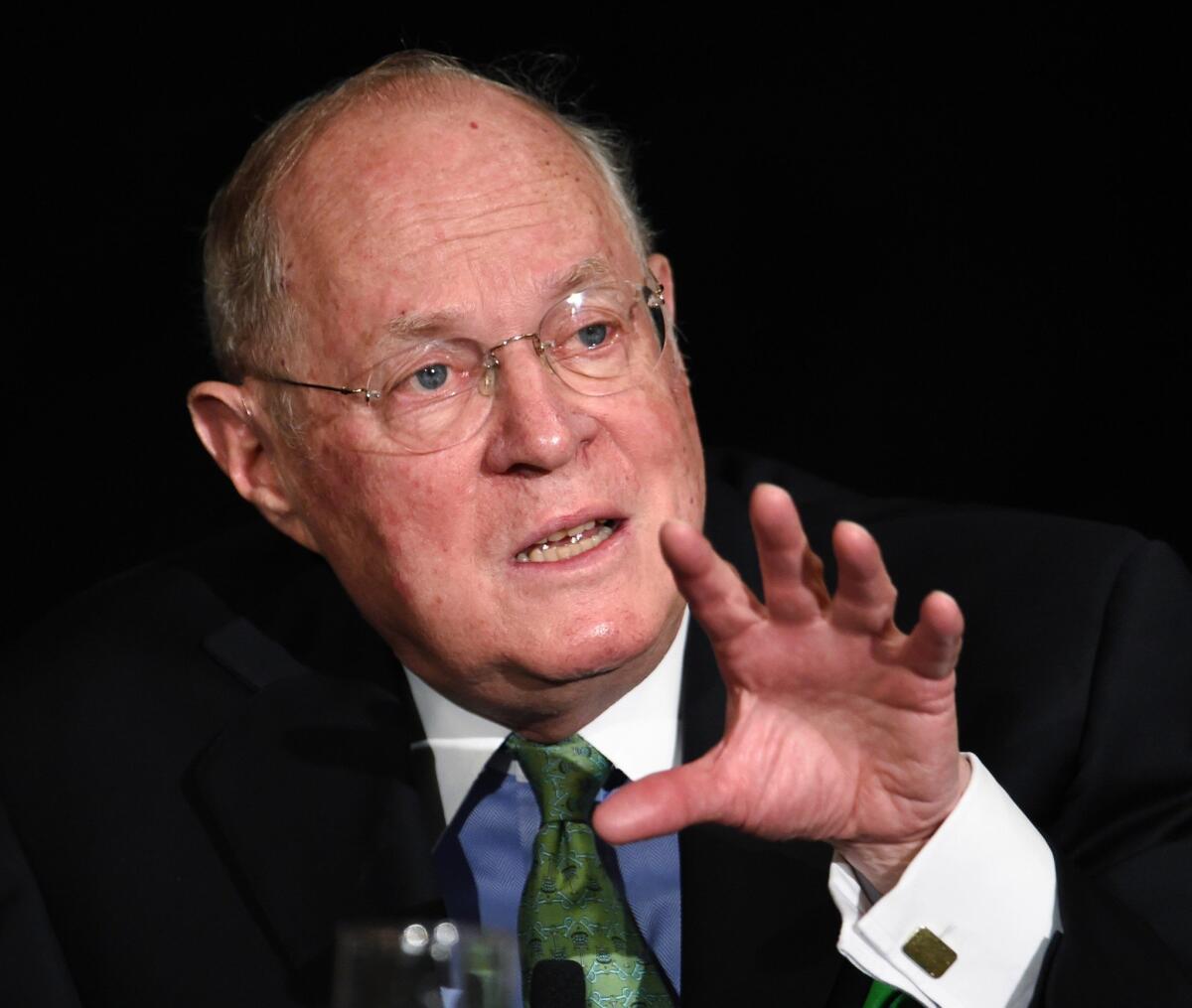Supreme Court appears in favor of ruling against racial gerrymandering in GOP-controlled states

- Share via
Reporting from Washington — A Supreme Court majority on Monday appeared to lean in favor of Democrats in Virginia and North Carolina seeking to rein in what they call racial gerrymandering by Republican-controlled legislatures in those states.
Justice Anthony M. Kennedy, who is likely to hold the deciding vote, said he was troubled that Republican leaders drew new election maps by moving more black voters into districts that already had a majority of African American residents and usually favored black candidates.
Civil rights lawyers and Democrats have contended these “packed” districts have the effect of diluting or weakening the political power of black and Latino voters in other districts and statewide.
“I have problems with that,” Kennedy said, suggesting he would question such districts if the “tipping point, the principal motivating factor was race.”
Trump’s victory assures a conservative majority on the Supreme Court. »
If the court’s majority agrees, the ruling would put states, counties and cities on notice that they may not concentrate more black and Latino voters into districts that already routinely elect minority representatives.
In Virginia, Republican lawmakers decided that each of the 12 districts that currently elect black candidates must maintain at least a 55% black voting population. And in North Carolina, Republican leaders moved tens of thousands of black voters in the Greensboro area into a district that had regularly elected a black Democrat to Congress.
In their defense, the Republicans said they acted to comply with the Voting Rights Act. The landmark law has been understood to mean states may not take steps that would reduce the number of districts that elect minority representatives. GOP lawmakers in both states argued they were protecting those seats.
They also insisted that their primary motivation was partisan politics, not race. Paul Clement, the former solicitor general who was representing the Republicans, described the central North Carolina district as a “political draw.” He said the state’s expert drew the district map based on “political data. He drew the map to draw Democrats in and Republicans out.”
Redrawing electoral districts based on partisan gerrymandering is not only a time-honored political tradition, he argued, it is legal.
But Marc Elias, lawyer for the Democrats, said the evidence produced at a trial showed the Republicans acted based on race. He noted that North Carolina legislators moved 75,000 African Americans into a district that had faithfully elected Rep. Mel Watt, a black Democrat, for more than 20 years before he left to lead the Federal Housing Finance Agency.
The exchange highlighted an issue that has bedeviled the justices and confused lower courts. Under the Constitution’s guarantee of equal protection, states may not make decisions based on race, but they may act based on political considerations. That distinction becomes murky when considering that African Americans vote reliably for Democrats. So is shifting black voters from one district into another a racial move or political one?
For the fourth time, the electoral college picks the loser of the popular vote. »
“This is such a complicated area,” said Justice Stephen G. Breyer. He noted that when pressed, Republican leaders acknowledged that “the reason we did that is most African Americans voters vote for Democrats.”
Last year, Breyer wrote a 5-4 decision for the court that set aside an Alabama redistricting plan because GOP lawmakers had similarly moved more blacks into black-majority districts. That opinion, which Kennedy joined, said it was unconstitutional to shift thousands of black voters into these districts, but it did not go far enough to resolve the current disputes.
The comments and questions during Monday’s arguments suggested the justices may split along similar lines.
The recent spate of redistricting cases put a spotlight on how the two ideological sides have shifted on racial gerrymandering.
Twenty years ago, the court’s conservatives struck down districts in which race was used as the predominant factor, pushing aside objections from liberals and many Democrats who said such plans were needed to elect minorities to legislatures.
But since the redistricting after the 2010 census, it is the now Democrats who have objected to the role race has played in the Republicans’ redrawing of districts.
Among the justices, only Kennedy has stuck to the same position. He objected to the race-based redistricting in the 1990s, and last year he joined the court’s four liberals to reject race-based electoral districts in Alabama.
The two cases heard Monday are Bethune-Hill vs. Virginia and McCrory vs. Harris.
Lurking in the background is the potentially more explosive issue of partisan gerrymandering, since both sides admit to having redrawn electoral maps to favor their candidates. Several lawsuits on the way to the court are urging the justices to prohibit state lawmakers from drawing electoral maps that lock in one party’s control of a legislature for a decade.
Last month, a federal court in Wisconsin struck down the state’s electoral map for its state assembly on the grounds the districts were drawn to lock in a solid majority for Republicans, even in years when most of its voters choose Democrats.
State officials say they plan to ask the Supreme Court to review the decision in the case of Whitford vs. Nichol. The justices have never struck down a state’s electoral map because it unfairly favored the candidates of one party over the other, but voting rights experts say they are optimistic that Kennedy is at least open to such a ruling.
On Twitter: DavidGSavage
ALSO:
Can Trump put another Justice Scalia on the Supreme Court?
More to Read
Sign up for Essential California
The most important California stories and recommendations in your inbox every morning.
You may occasionally receive promotional content from the Los Angeles Times.











